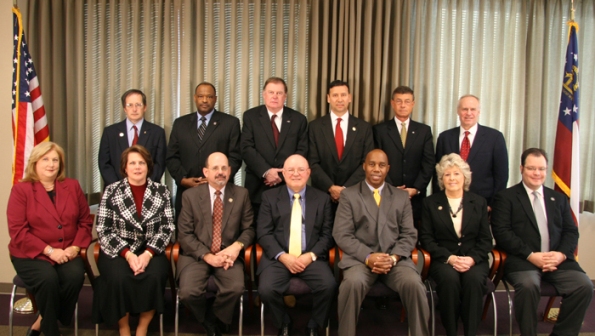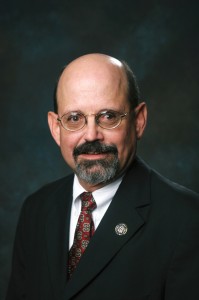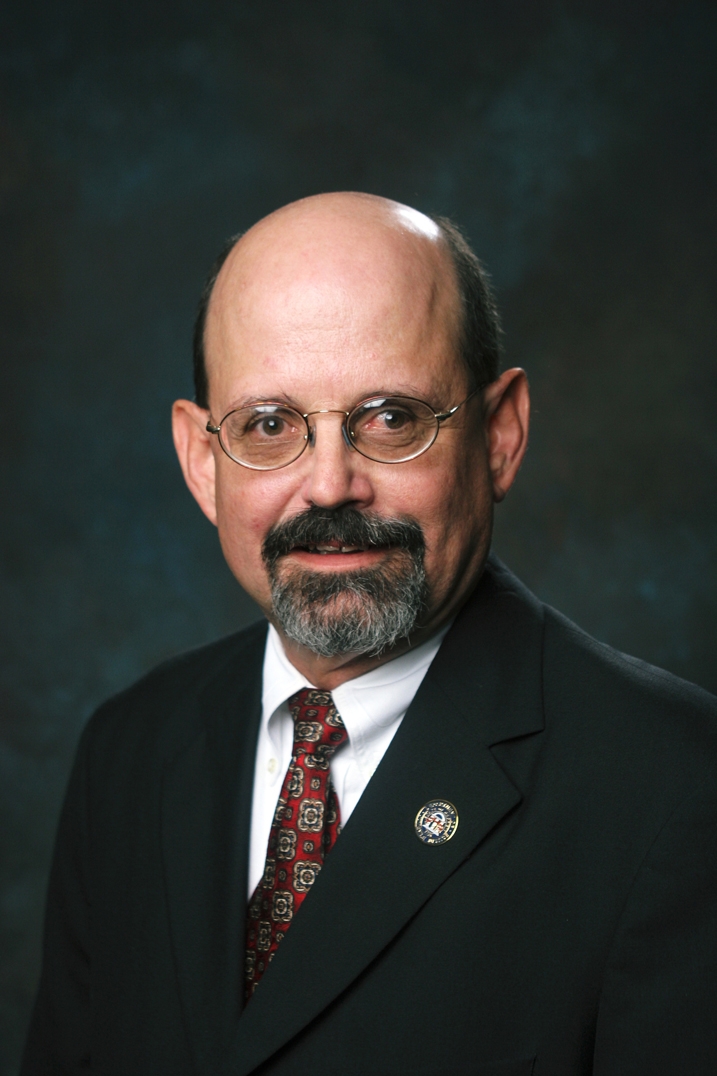
Georgia's Department of Juvenile Justice Board, 2010. Ed Risler (front, third from left) served on Georgia's DJJ Board for more than a decade, most recently as chairman.
 |
After more than a decade of service, Georgia Department of Juvenile Justice Board Chairman Ed Risler stepped down from his post earlier this month following the expiration of his term in the summer.Risler outlasted many Ga. DJJ senior staff members, working with five commissioners over the years. He's seen the Department undergo a number of changes -- from federal mandates to the accreditation of the DJJ school system -- and remains optimistic about the future, despite budgetary constraints.A longtime professor at the University of Georgia, Risler is a licensed clinical social worker and marriage and family therapist. His research and teaching focuses on juvenile justice, poverty, international social work and a number of related areas.JJIE caught up with Risler last week to get his take on the past, present and future of the agency charged with overseeing and rehabilitating juveniles offenders throughout the state. |
JJIE: You’ve served on the DJJ Board for more than a decade. From your perspective, what are some the things, past and present, that have changed or been accomplished over the years?
Risler: “One of the major things was getting out from under the oversight from the federal government with the memorandum of agreement. Those were some tough times. They were tough in the sense that we had to change and meet these standards – there was 150 of them I believe – that covered a number of areas: mental health, protection from harm, education, and all these sorts of things. But it was good because we had a lot of the resources we needed to have funding wise to comply with those things.
We did real good in doing that and I think one of the cornerstone achievements of that is the fact our academic programs in all our institutions are accredited. They’re accredited by SACS and Correctional Education Association, which was a result of a lot of the hard work of a number of people that were there and saw that stuff go through.
So essentially, the education our kids were getting was as good an education as they were getting at any public school in the state, if not better, I would argue. The commissioners involved in that were really good. When we got through with that Albert Murray was the commissioner, which was really good.
The ironic thing was right after we did that and we celebrated, I think the economy tanked and times of austerity kicked in and things got kind of tough. We had to get to our core function.
Putting it this way, we ended up going from a $300 million budget to a $200 million budget, and you cannot maintain – it’s no fault of anybody’s it’s just the economy.
It wasn’t anybody's fault. I think people were doing the best they could, but we just had to make some cuts and when you make the cuts that were as traumatic as that there’s no way you could maintain the level of services.
So I think we’ve really done our best to really do the best we can in spite of that fact. Commissioners that have come in have tried to do that.
You know, it’s not the warm-and-fuzzy kind of thing. It’s a public safety issue, and it’s a tough thing. What we do to try and help kids often times doesn’t come into fruition until later on, so you can’t sort of see the benefits of what we do.
I do believe we help a lot of kids and I believe everybody who works in the Department is committed to trying to do that. Anybody who works for the Department of Juvenile Justice certainly is not doing it for the money – because they don’t get paid a whole lot – but they’re there doing the things day in and day out to… it’s a double edged sword is some respects: to try to protect the community but also to try to rehabilitate the kids that are in our care.
I think it’s in good hands with commissioner Buckner. I think she’s fabulous. I think Governor Deal made a good choice in appointing her. I like what he has done in prioritizing and recognizing that that sort of investment in what the Department does is a good thing for the state of Georgia as a whole.
JJIE: What are some of the challenges GA DJJ faces moving forward?
Risler: “Pragmatically, I think it’s not the biggest department. In terms of competing in a practical sense with other departments for what the Department needs is sometimes difficult. That’s a hard thing to do when you’re going after a piece of the pie, so to speak.
The other thing I think is a challenge is that the mission is two fold. On one hand we’re about public safety. There’s a reality about public safety. We have children that are confined because they have done some things that aren’t real good.
On the other hand, and this is the other side of the double-edged sword, is the fact that we are mandated or charged with trying to rehabilitate them and make them productive members of society. And there are times those things run counter to one another, and that’s a hard thing to do.
What happens sometimes is the Department is really an easy target for criticism. Day in and day out we deal with some challenging youth, and there’s no getting around that, that’s just part of what we do. And in spite of our best efforts there are times where things happen even though we have everything in place and every kind of policy you can imagine that would address every situation.
Sometimes, unfortunately, some stuff may happen. That’s sort of a difficult challenge we have to overcome.
Fortunately, if you look at the big picture of all the kids the Department serves everyday you’d have to say it does an excellent job. When you think about all the kids we serve and all the kids in confinement you would think there might be a lot more [negative things] going on, but there’s not.
I wouldn’t have served as long as I did if I didn’t think it was a worthy thing to do.
You cannot see what the Department does for kids until five or 10 years down the road when they’re adults and they’re okay. The Department doesn’t get to see the fruit that it bears for a long time down the road, so it’s hard to recognize that or see it in that context.
I’m actually a product of that. I was a kid who had gotten into trouble. I was a high school dropout. I went through the system in Florida, but not up here, and so that’s one of the reasons I got into the business I was in and focused my area of research as well.
I think people see the kids that we serve as if they’re something else, but they’re like every other kid. The only thing that makes a juvenile delinquent is he’s the kid that got caught. Everybody else didn’t get caught.
Everybody has done something when they were young that if they had gotten caught they would have in trouble. Now people don’t necessarily want to admit that, but that’s the only real difference. You’ve got some kids that get caught and some that don’t. But unfortunately, sometimes, they get characterized as if they’re something different, like they’re not like anybody else, but that’s not necessarily true.
Part of the stigma of the type of kid we deal with, sometimes, is a challenge to overcome. You don’t get a lot of sympathy at times from people.
JJIE: What do you see as the best path forward for the DJJ?
Risler: “I think if we maintain our focus on what we’re doing – to me it appears the economy is improving – particularly this year I’m pleased with the recommendations made by the governor.
I mean, the last three years we’ve had significant cuts and had to close facilities. It’s very difficult when you talk about laying people off because you’re affecting people’s lives, which we had to do.
Now it seems things are stable and we’re not just reacting to a financial crisis. I think there’s some stability that’s come in and we’re able to kind of get back to our focus and our goals and move in a direction that’s positive, that will help kids that have a lot of needs. I’m good about that, that’s the way we’re going.
We focus on education, which is a good thing.
If there’s one thing we can do, that’s consistently shown in the research, is the development of one’s human capital. If you can teach somebody a skill and they walk out of our facility with something in their hand they have a greater chance of not returning into the criminal justice system. I think we’ll keep our focus going. Up to this point we’ve really had to react to budget cuts, although that’s no fault of anybody’s but just the situation and how it was.
JJIE: So what does the future hold for you?
Risler: "Well, I’m a full professor at the University of Georgia. I teach in the School of Social Work.
Being on the Board is something I’ve been committed to doing as part of my service commitment to the University. The University of Georgia is a land grant university, which is the idea that we do things that instill in the citizenry of Georgia to help them out – and that was kind of my goal in [serving on the Board]. Fortunately enough, I was allowed the ability to do that.
So now I’m back, still doing what I was doing before at the University: teaching and doing research. A lot of my research is in the area of juvenile justice.
I had an op ed in the AJC (Atlanta Journal-Constitution) about a year ago. It recognized that our educational programs are accredited. At the time, I didn’t know of another state in the Union that had state-operated correctional facilities with educational programs that are accredited. I think that was something noteworthy of tooting the horn about. I mean, that’s phenomenal.
People always hear when something bad happens at the DJJ. Part of the challenge is overcoming that misperception of what we do, and that’s unfortunate, but that’s like any other agency I guess.
I’d like to say one more thing: I’m very confident in Commissioner Buckner’s vision and style of management and the direction she’s moving in. I feel real good about that. I feel real good about all the members of the Board. They help support and guide the vision for the Department.
I think it’s going to be fine."
